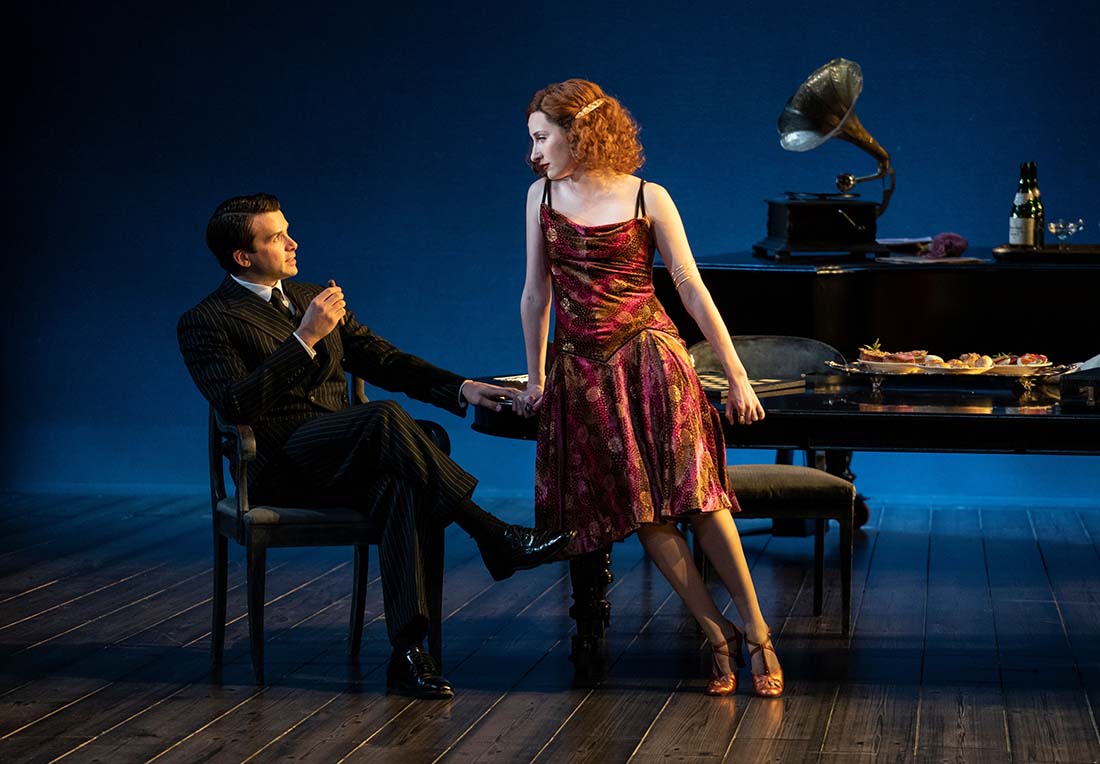What an overwhelming day! Back in NYC for the first time in nearly three years. Two strong plays, both thrilling in the daring of their undertaking and witty and moving in very different ways. Both are meditations on misfortune, and in each play characters show us what it is to be “laughing wild amid severest woe,” a borrowed Beckett line which could stand as the headnote for both Leopoldstadt and Cost of Living.

LEOPOLDSTADT at the Longacre Theatre
A new play by Tom Stoppard—perhaps the most important living playwright writing in English—is a huge event. Leopoldstadt is also, literally, huge: more than two hours with no intermission and a cast of 26 actors in nine scenes covering the history of the Jews in Austria from 1899 to 1955. The play’s title refers to the Jewish ghetto in Vienna in WWII.
It begins in a festive mood and offers us, in the first few minutes, an ironic emblem what will follow: a boy places a star of David atop a Christmas tree. These are Jews—prosperous, cultured, conflicted—whose goal is assimilation. The irony is echoed later when, after a debate about the formation of a Jewish state, the men raise glasses in a toast: “To a homeland for the Jews. Happy Christmas.”
Much has already been written about Stoppard’s discovery of his own Jewish heritage: when his mother remarried a British officer who adopted Tom, he became English: good at cricket, happy to learn a language that would serve him very well. When Stoppard’s surrogate character, Leo (a nominal remnant of the ghetto) discovers, as Stoppard recently did, that he is Jewish and has a tragic family history, he reads the roll of all his relatives who died in the Holocaust, acknowledging the terrible past.
Scene after scene shows us ever-increasing misery and terror; this is a shocking lesson in dramatic irony. As Sophocles knew, once an audience knows more than the characters about the terrible events waiting for them, our tragic tension grows. There is no way we can shout to Oedipus, “No, no, don’t marry her!” just as there is no way to shout to the Jews of eastern Europe, “Get out. Now!”
Patrick Marber directs the excellent cast, although with so many characters with so many accents representing so many generations and so many points of view, it is hard to keep track of everybody and to emotionally invest in them as people. This distancing is furthered by the long speeches about politics and psychology and history and mathematics. There are moments that approach the vaudevillian—kids running across the stage, adults shouting lines— and other moments that try to spice things up with an adulterous romance that turns out to be a last laugh.
The old photographs that separate the scenes are moving, as is the picture we hear about in the album: two unidentified people waving goodbye.

COST OF LIVING Manhattan Theatre Club at the Samuel J. Friedman Theatre
This dazzlingly theatrical, heart wrenching Pulitzer-winning play by Martyna Majok is not to be missed. Not only because it’s so very very good, but because the brilliant, brave cast would be hard to duplicate;
Two of the four actors are, like their characters, disabled (“Don’t call it differently-abled—it’s fucking retarded”). And we’re off. This is as unlikely a meet-cute rom-com as you’ll find anywhere—hilarious, painful, and deeply sad. The cost of living is very high.
The speaker of the above line is John (Gregg Mozgala whose real-life cerebral palsy is not as severe as John’s). He hires a caretaker, Jess (Kara Young) who struggles to survive, working in bars, sleeping in her car.
Elsewhere, but also in New Jersey, Eddie (David Zayas), an unemployed truck driver begs his wheelchair-bound wife, Ani (Katy Sullivan, a four-time US champion in the 100m who represented the USA in the 2012 London Paralymics) to let him care for her.
The two pairs alternate scenes; it rains; it snows; he bathes her, she bathes him. In the course of 100 minutes we come to know and care about these four people, partly because the acting is so solid and moving and funny, and partly because the dialogue is so sharp and character-driven. The simplicity of the play’s structure, the profoundly wise direction by Jo Bonney, the subtle scenic design by Wilson Chin all make this one not to miss because “The shit that happens is not to be understood.”
